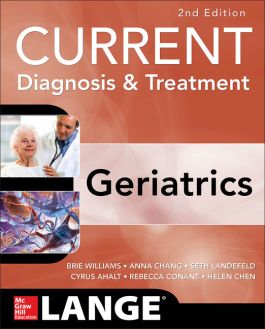Current Diagnosis and Treatment: Geriatrics 2E
Step 1. Download Adobe Digital Editions Both PC and Mac users will need to download Adobe Digital Editions to access their eBook. You can download Adobe Digital Editions at Adobe's website here.
Step 2. Register an Adobe ID if you do not already have one. (This step is optional, but allows you to open the file on multiple devices) Visit account.Adobe.com to register your Adobe account.
Step 3: Authorize Adobe Digital Editions using your Adobe ID. In Adobe Digital Editions, go to the Help menu. Choose “Authorize Computer.”
Step 4: Open your file with Adobe Digital Editions. Once you’ve linked your Adobe Digital Editions with your Adobe ID, you should be able to access your eBook on any device which supports Adobe Digital Editions and is authorized with your ID. If your eBook does not open in Adobe Digital Editions upon download, please contact customer service
- Section I. Principles of Geriatric Care
- 1. Transforming the Care of Older Adults: Knowledge, Skills, & System Change
- Guiding Principles
- 2. Consideration of Function & Functional Decline
- Geriatric Principles
- Epidemiology of Functional Limitations
- Assessment of Functional Status
- Risk Factors for Functional Decline
- Prevention of Functional Decline
- Rehabilitation: The Treatment of Functional Decline
- 3. Goals of Care & Consideration of Prognosis
- Goals of Care Discussions
- A Practical Guide to Goals of Care Discussions
- Importance of Surrogate Decision Makers
- Prognostication
- Prognosis Related to Specific Diseases
- Communicating Prognosis to Patient or Surrogate
- 4. The Social Context of Older Adults
- Financial Issues in the Third Age
- Food Insecurity and Older Adults
- Medicare
- Housing and Long-Term Care
- Caregiving
- Recommendations for Clinicians
- 5. The Interprofessional Team
- Key Definitions and Concepts
- Interprofessional Team Innovations in Geriatrics
- Evidence of Interprofessional Teams in the Care of Older Adults
- Resources and Tools for Teamwork
- Barriers to the Advancement of Teamwork
- Future Steps
- 6. Geriatric Assessment
- Teams and Clinical Sites of Care
- Prognosis
- Patient Goals
- Functional Assessment
- Preventive Services
- Falls and Gait Impairment
- Vision Impairment
- Hearing Impairment
- Dementia
- Incontinence
- Depression
- Nutrition
- Medication Use
- Caregiver Support
- Financial, Environmental and Social Resources
- Abuse
- Geriatric Assessment in Primary Care
- 7. Atypical Presentations of Illness in Older Adults
- Defining Atypical Presentations
- Identifying Patients at Risk
- 8. Prevention & Health Promotion
- Screening Issues for the Geriatric Population
- Geriatric Syndromes
- Health-Related Behaviors
- Immunizations
- Endocrine Disorders
- Cardiovascular Disease
- Cancer
- 9. Principles of Prescribing for Older Adults
- Geriatric Principles
- Drug Metabolism and Physiologic Effects in Older Adults
- Geriatric Therapeutics
- Prescribing for Older Adults
- Adherence
- Managing Complexity
- Prescribing Across the Care Continuum
- 10. Addressing Multimorbidity in Older Adults
- Background and Definitions
- Multimorbidity and Health Outcomes
- Clinician Challenges in the Care of Older Adults with Multimorbidity
- General Considerations in the Care of Multimorbid Older Adults
- 11. Geriatrics & Palliative Care
- Overview of Palliative Care
- Psychological, Spiritual, and Social Issues
- Communication, Decision Making, and Advance Care Planning
- Challenges to Providing Palliative Care in Long-Term Care Settings
- Caring for Family Members: Grief and Bereavement
- 12. Ethics & Informed Decision Making
- Ethical Issues in the Care of Older Adults
- Decision-Making Capacity and Informed Decision Making
- Advance Care Planning and Advance Directives
- Surrogate Decision Making
- Balancing Promotion of Independence and Patient Safety
- Section II. Care Settings
- 13. Transitions and Continuity of Care
- General Principles in Older Adults
- Definitions
- Background
- Adverse Events During Transitions
- Barriers to Successful Care Transitions
- Overcoming the Barriers: Best Practices
- Evidence-Based Interventions
- Innovations
- Conclusion
- 14. Ambulatory Care & the Patient-Centered Medical Home
- General Principles in Older Adults
- Personal Physician
- Physician Directed Medical Practice
- Whole-Person Orientation
- Care Coordination and Integration
- Quality and Safety
- Enhanced Access
- 15. Providing Quality Care to Older Adults in the Emergency Department
- General Principles
- Models of Emergency Care
- Structural Enhancements
- Financing
- Clinical Care
- Future of Emergency Care
- 16. Hospital Care
- General Pr

